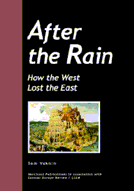Never before has the Balkans been more of a powder keg, ready to detonate thunderously. Never before has it been so fractured among political entities, some viable—many not. Never before has it been dominated by a single superpower, not counter-balanced by its allies nor shackled by its foes. This is a disastrous state of things, and it's about to get worse.
Driven by America—this amalgam of violent frontiersmen, semi-literate go-getters and malignant optimists ("with some goodwill there is always a solution and a happy ending")—the West has committed the sins of ignorant intervention and colonial perpetuation. Peace among nations is the result of attrition and exhaustion, of mutual terror and actual bloodletting—not of amicable agreement and visionary stratagems.
It took two world wars to make peace between France and Germany. By forcing an unwanted peace upon an unwilling populace in the early stages of every skirmish, the West has ascertained the perpetuation of these conflicts. Witness Bosnia and its vociferous nationalist Croats. Witness the Albanians of Macedonia and Kosovo and their chimerical armies of liberation. These are all cinders of hostilities artificially suppressed by Western procurators and Western cluster bombs.
The carrot would've been nice
The West should have dangled the carrots of NATO and EU memberships in front of the bloodied pugilists, instead of ramming them down their reluctant throats in dispalys superiority. Humanitarian aid should have been provided and grants and credits for development given to the deserving. But the succour afforded by the likes of Germany to the likes of Croatia and by the benighted Americans to the most extreme elements in Kosovo served only to amplify and prolong the suffering and warfare.
The West obstinately refused—as it still does—to contemplate the only feasible solution to the spectrum of Balkan questions. Instead of convening a new Berlin Congress and redrawing the borders of the host of entities, quasi-entities and fraction entities that emerged with the disintegration of the Yugoslav Federation, the West foolishly and blindly adheres to unsustainable borders which reflect colonial decision-making and ceasefire lines.
In the absence of a colonizing power, only ethnically-homogeneous states can survive peacefully in the Balkan. The West should strive to effect ethnic homogenization throughout the region by altering borders, encouraging population swaps and transfers and discouraging ethnic cleansing and forced assimilation ("ethnic denial").
Getting it all wrong
But the West's blunders are not confined to the political and geopolitical realms.
The West (actually, America) has many long arms, the IMF and World Bank being the most prominent. These ostensible multilaterals have committed yet another strategic blunder. Instead of weaning their clientele—the post-Communist countries in transition—off central planning and command economics, they engaged in Washington-based micromanagement of their economies.
The Bretton-Woods institutions have become all-pervasive, multi-tentacled approximations of the Communist party. They dictate policy, involve themselves in the minutest details of daily management, veto decisions (economic and non-economic), cajole and threaten governments, block private sector lending and compete in the international credit and investment markets.
The post-Communist countries in transition are like infants taking their first steps in the demanding world of free markets and capitalism. The multilateral financial institutions are the mother figures. Good mothers let go, encourage in the child a sense of independence, self-reliance, learning by mistakes and the predictability of just rewards and punishments. Bad mothers refuse to acknowledge the emerging boundaries of their off-spring. They reward clinging behaviour and punish every act of separation and individuation. They are overweening, doting, crushing figures. In short: they micromanage.
From my book Malignant Self Love: Narcissism Revisited:
The separation from the mother, the formation of an individual, the separation from the world (the 'spewing out' of the outside world)—are all tremendously traumatic. The infant is afraid to lose his mother physically (no 'mother permanence') as well as emotionally (will she be angry at this new-found autonomy?). He goes away a step or two and runs back to receive the mother's reassurance that she still loves him and that she is still there.
The tearing up of one's self into my SELF and the OUTSIDE WORLD is an unimaginable feat... The child's mind is shredded to pieces: some pieces are still HE and others are NOT HE (=the outside world). This is an absolutely psychedelic experience (and the root of all psychoses, probably). If not managed properly, if disturbed in some way (mainly emotionally), if the separation - individuation process goes awry, it could result in serious psychopathologies. There are grounds to believe that several personality disorders (Narcissistic and Borderline) can be traced to a disturbance in this process in early childhood. Then, of course, there is the on-going traumatic process that we call 'life.'
Sam Vaknin, 4 June 2001
The author:
The author is General Manager of Capital Markets Institute Ltd, a consultancy firm with operations in Macedonia and Russia. He is an Economic Advisor to the Government of Macedonia.
DISCLAIMER: The views presented by the author in this article represent only the personal opinions and judgments of the author.
Moving on:

Sam Vaknin's book on sale from CER as a print book and as an ebook
|
Moving on:
- Archive of Sam Vaknin's articles in CER
- Archived articles about Macedonia in CER
- Browse through the CER eBookstore for electronic books
- Buy English-language books on Central Europe through CER
- Sam Vaknin's Website
- Return to CER front page




